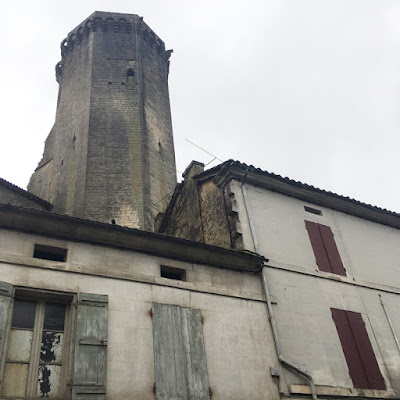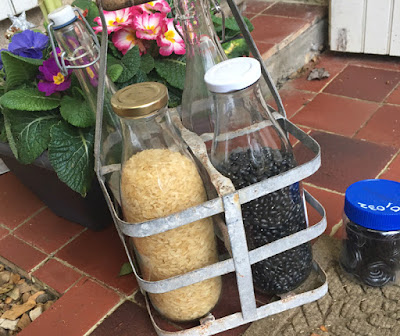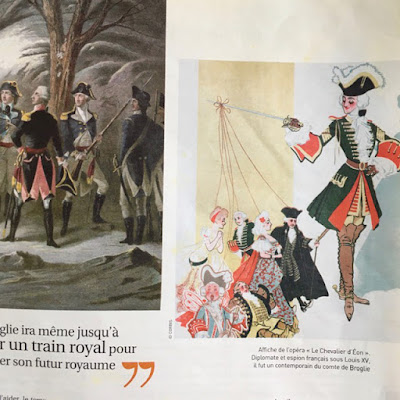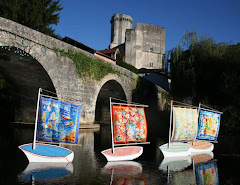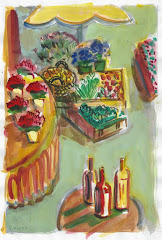The winter days are grey and foggy in Bourdeilles, but look closely and you’ll see a little sparkle in the main street. A young lady has dared to open up a shop in the practically abandoned center of the village. Her name is Pauline. Her’s is a gutsy adventure, but this is exactly the sort of madness that a small village in France needs.
If you don’t live in Bourdeilles and you drive through too quickly you’ll think that it’s a ghost town, but if you slow down and turn your head at just the right moment you will notice some happy lights twinkling in a window between gloomily closed shutters. You’ve spotted Bourdeilles’ newest spark of life. A little grocery with so much more to offer than you would imagine - L’épicerie Abracada’vrac— ‘the magic little grocery store for buying in bulk’. I just call it the magic shop.
Pauline is the third generation on her father’s side to live in Bourdeilles - the eighth generation on her mother’s side. She didn’t grow up here, but spending all those summers and school vacations with her grandparents gave her a taste of village life. After a few years working in the city she and her partner made the decision to slow down life and to start a family smack dab under one of the tallest castle towers in France. Pauline’s dream has been to open up a little grocery. The couple worked out that they could create a shop in the basement of their home under the castle. Like shop keepers of days gone by the family lives upstairs and the commerce is downstairs (if you look carefully you’ll spot the baby monitor on the checkout counter next to the register..). This all encompassing way of life has been disappearing, but lately there is a small revival as some young people are trading the hustle of city life for a quieter one in the country.
It’s a bit of an adventure to shop at Abracada’vrac. There is no parking lot at the entrance. You either have to park your car by the river and wander up, or below the church and wander down. Walking from my house, I pass under the castle tower and through a multi-centuries canyon of houses, equipped with empty shopping containers. Shopping here is BYOC (bring your own container). The shop entrance opens abruptly onto the street. The door handle is decidedly 1940’s French and I have to mind the couple of steps down into the warm and welcoming shop. Pauline greets me with a wide smile that sparkles with enthusiasm. You can’t help but be caught up in her pride for what she has created. A pride that is shared by the community. She courageously sent out a request for seed money. Where times are always a little tough the concept of crowd-funding isn’t something you find in a small village in France. It ain’t easy to ask, but ask she did. She is encouraged by the enthusiastic response of the folks of Bourdeilles. She in turn invested in the community by hiring a local furniture maker to help plan and build the custom shelving for the awkward, cramped space. They have quite successfully created an atmosphere of simple elegance.
Here’s what I’ve spied in the magic shop so far— black licorice, spicy crackers, several choices of pastas, beans, flours and rice. I’m currently obsessed with a rice that comes from the Camargue region of France. There are olive oils from Provence and walnut oil from our region of Aquitaine. There is a section of cleaning products from detergents to toothpaste. There are household and baby care items that are practical and pretty at the same time. These make great little gifts.
It’s going to take me awhile to organize the correct containers for shopping and storing what I buy at the magic store. I’m enjoying having a practical use for my milk bottle caddy and all the apple juice bottles I’ve been saving. I might have to spring for some more mason jars with wider openings for filling. My goal is that our pantry will look more like a calm photo in a country living magazine than the spoils from a rampage in a dollar store.
Pauline has done the hard part for us. She screwed up the courage to launch herself into risks and long hours of work in order to concretely do something about her conviction that the long term global cost of our shopping habits is not acceptable. Wrapped up in this conviction is also the desire to help animate our little village. Now it’s up to us oldies to grab a basket and some jars and enjoy the magic and sparkly light offered by this little épicerie in our small village in France.
--join her on FaceBook Abracada'Vrac-Épicerir Vrac Bourdeilles
or
www.AbracadaVracBourdeilles.com
--a couple of other "frenchie" food sites I'm enjoying on instagram
- katedecamont
-dancing.tomatoes




